Leadership & Management: How to Get the Best Out of Me as an Employee
VerifiedAdded on 2023/06/05
|6
|1573
|383
Essay
AI Summary
This essay discusses the importance of human resources in organizational success, emphasizing the value of employees and their unique skills. It explores personal skills and characteristics, particularly in a management position, highlighting personality traits such as leadership, charisma, and authenticity. The essay delves into communication skills, persuasion, and conflict resolution, noting the importance of emotional connection and collaboration in the workplace. It reflects on the author's leadership style and the application of human relations management theory to foster strong interpersonal relationships and improve organizational outcomes. The author aims to leverage these skills to build strong bonds with colleagues, aligning with a democratic leadership style and contributing to positive transformations within the organization.
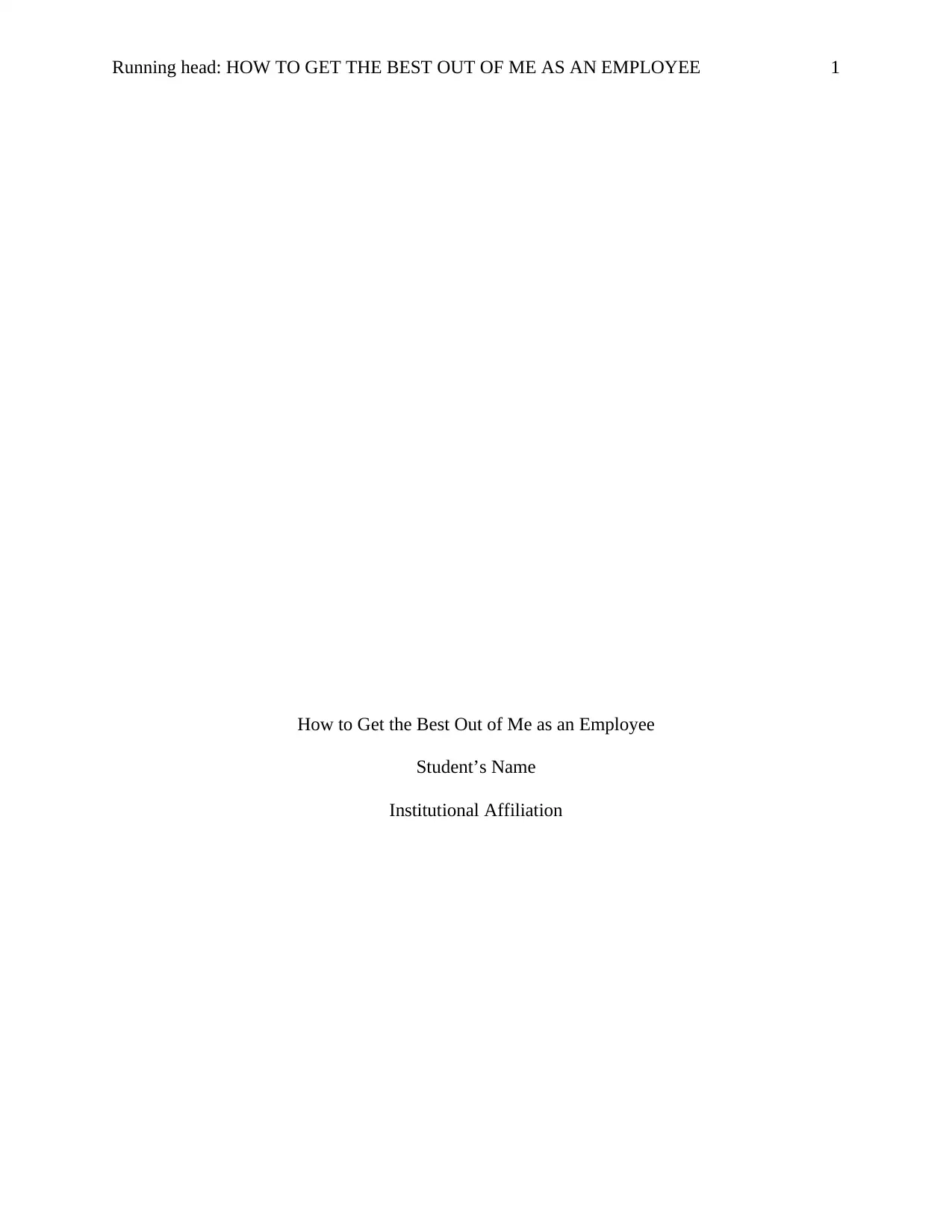
Running head: HOW TO GET THE BEST OUT OF ME AS AN EMPLOYEE 1
How to Get the Best Out of Me as an Employee
Student’s Name
Institutional Affiliation
How to Get the Best Out of Me as an Employee
Student’s Name
Institutional Affiliation
Paraphrase This Document
Need a fresh take? Get an instant paraphrase of this document with our AI Paraphraser
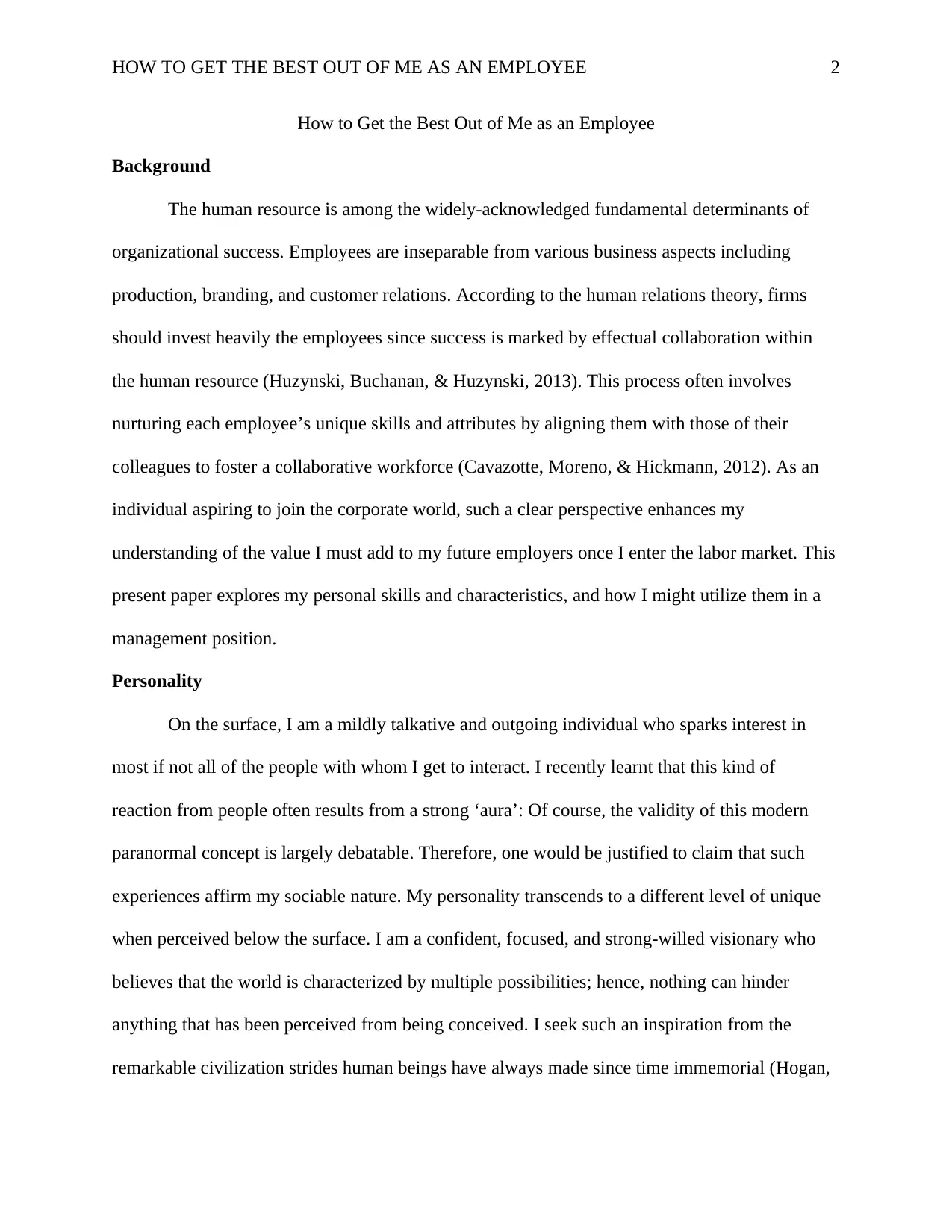
HOW TO GET THE BEST OUT OF ME AS AN EMPLOYEE 2
How to Get the Best Out of Me as an Employee
Background
The human resource is among the widely-acknowledged fundamental determinants of
organizational success. Employees are inseparable from various business aspects including
production, branding, and customer relations. According to the human relations theory, firms
should invest heavily the employees since success is marked by effectual collaboration within
the human resource (Huzynski, Buchanan, & Huzynski, 2013). This process often involves
nurturing each employee’s unique skills and attributes by aligning them with those of their
colleagues to foster a collaborative workforce (Cavazotte, Moreno, & Hickmann, 2012). As an
individual aspiring to join the corporate world, such a clear perspective enhances my
understanding of the value I must add to my future employers once I enter the labor market. This
present paper explores my personal skills and characteristics, and how I might utilize them in a
management position.
Personality
On the surface, I am a mildly talkative and outgoing individual who sparks interest in
most if not all of the people with whom I get to interact. I recently learnt that this kind of
reaction from people often results from a strong ‘aura’: Of course, the validity of this modern
paranormal concept is largely debatable. Therefore, one would be justified to claim that such
experiences affirm my sociable nature. My personality transcends to a different level of unique
when perceived below the surface. I am a confident, focused, and strong-willed visionary who
believes that the world is characterized by multiple possibilities; hence, nothing can hinder
anything that has been perceived from being conceived. I seek such an inspiration from the
remarkable civilization strides human beings have always made since time immemorial (Hogan,
How to Get the Best Out of Me as an Employee
Background
The human resource is among the widely-acknowledged fundamental determinants of
organizational success. Employees are inseparable from various business aspects including
production, branding, and customer relations. According to the human relations theory, firms
should invest heavily the employees since success is marked by effectual collaboration within
the human resource (Huzynski, Buchanan, & Huzynski, 2013). This process often involves
nurturing each employee’s unique skills and attributes by aligning them with those of their
colleagues to foster a collaborative workforce (Cavazotte, Moreno, & Hickmann, 2012). As an
individual aspiring to join the corporate world, such a clear perspective enhances my
understanding of the value I must add to my future employers once I enter the labor market. This
present paper explores my personal skills and characteristics, and how I might utilize them in a
management position.
Personality
On the surface, I am a mildly talkative and outgoing individual who sparks interest in
most if not all of the people with whom I get to interact. I recently learnt that this kind of
reaction from people often results from a strong ‘aura’: Of course, the validity of this modern
paranormal concept is largely debatable. Therefore, one would be justified to claim that such
experiences affirm my sociable nature. My personality transcends to a different level of unique
when perceived below the surface. I am a confident, focused, and strong-willed visionary who
believes that the world is characterized by multiple possibilities; hence, nothing can hinder
anything that has been perceived from being conceived. I seek such an inspiration from the
remarkable civilization strides human beings have always made since time immemorial (Hogan,
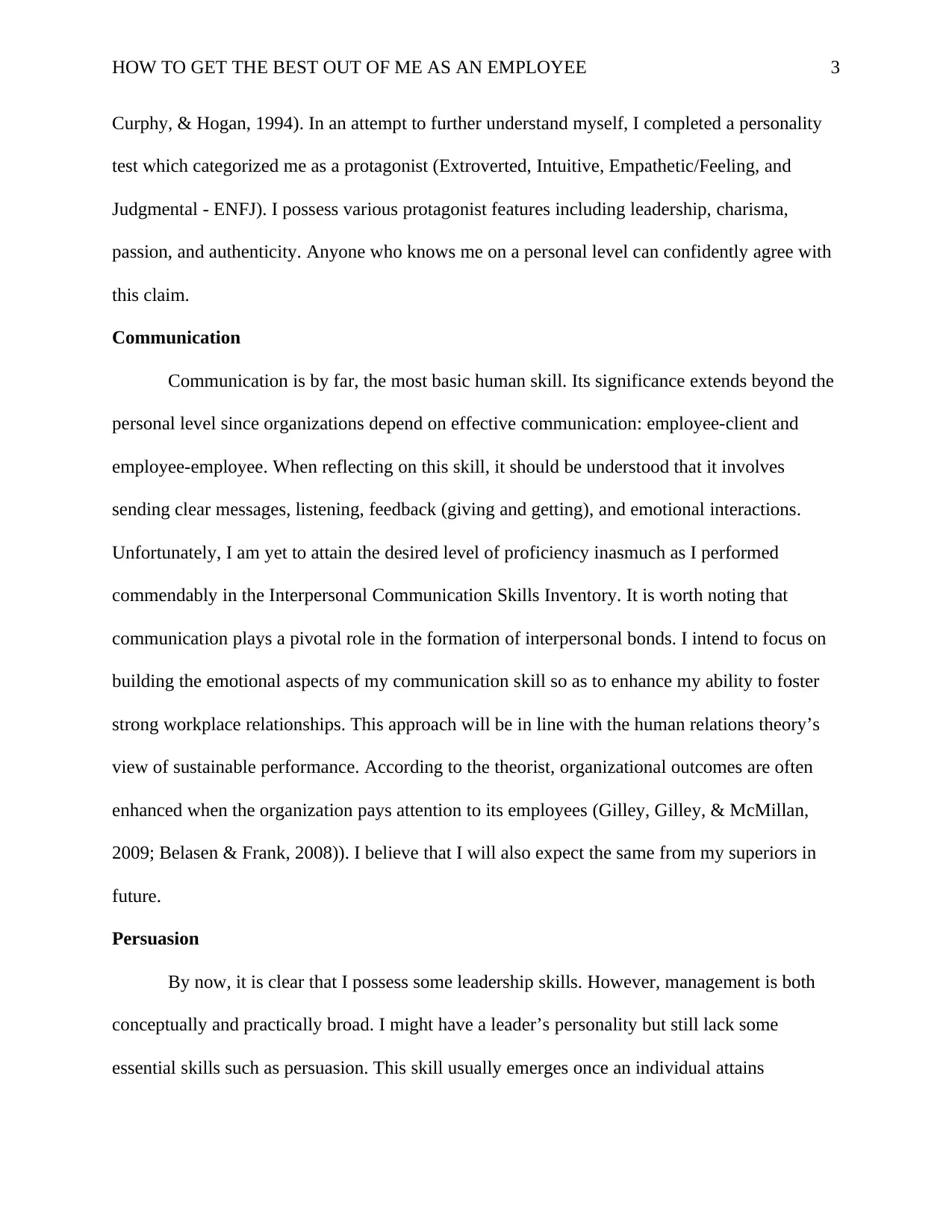
HOW TO GET THE BEST OUT OF ME AS AN EMPLOYEE 3
Curphy, & Hogan, 1994). In an attempt to further understand myself, I completed a personality
test which categorized me as a protagonist (Extroverted, Intuitive, Empathetic/Feeling, and
Judgmental - ENFJ). I possess various protagonist features including leadership, charisma,
passion, and authenticity. Anyone who knows me on a personal level can confidently agree with
this claim.
Communication
Communication is by far, the most basic human skill. Its significance extends beyond the
personal level since organizations depend on effective communication: employee-client and
employee-employee. When reflecting on this skill, it should be understood that it involves
sending clear messages, listening, feedback (giving and getting), and emotional interactions.
Unfortunately, I am yet to attain the desired level of proficiency inasmuch as I performed
commendably in the Interpersonal Communication Skills Inventory. It is worth noting that
communication plays a pivotal role in the formation of interpersonal bonds. I intend to focus on
building the emotional aspects of my communication skill so as to enhance my ability to foster
strong workplace relationships. This approach will be in line with the human relations theory’s
view of sustainable performance. According to the theorist, organizational outcomes are often
enhanced when the organization pays attention to its employees (Gilley, Gilley, & McMillan,
2009; Belasen & Frank, 2008)). I believe that I will also expect the same from my superiors in
future.
Persuasion
By now, it is clear that I possess some leadership skills. However, management is both
conceptually and practically broad. I might have a leader’s personality but still lack some
essential skills such as persuasion. This skill usually emerges once an individual attains
Curphy, & Hogan, 1994). In an attempt to further understand myself, I completed a personality
test which categorized me as a protagonist (Extroverted, Intuitive, Empathetic/Feeling, and
Judgmental - ENFJ). I possess various protagonist features including leadership, charisma,
passion, and authenticity. Anyone who knows me on a personal level can confidently agree with
this claim.
Communication
Communication is by far, the most basic human skill. Its significance extends beyond the
personal level since organizations depend on effective communication: employee-client and
employee-employee. When reflecting on this skill, it should be understood that it involves
sending clear messages, listening, feedback (giving and getting), and emotional interactions.
Unfortunately, I am yet to attain the desired level of proficiency inasmuch as I performed
commendably in the Interpersonal Communication Skills Inventory. It is worth noting that
communication plays a pivotal role in the formation of interpersonal bonds. I intend to focus on
building the emotional aspects of my communication skill so as to enhance my ability to foster
strong workplace relationships. This approach will be in line with the human relations theory’s
view of sustainable performance. According to the theorist, organizational outcomes are often
enhanced when the organization pays attention to its employees (Gilley, Gilley, & McMillan,
2009; Belasen & Frank, 2008)). I believe that I will also expect the same from my superiors in
future.
Persuasion
By now, it is clear that I possess some leadership skills. However, management is both
conceptually and practically broad. I might have a leader’s personality but still lack some
essential skills such as persuasion. This skill usually emerges once an individual attains
⊘ This is a preview!⊘
Do you want full access?
Subscribe today to unlock all pages.

Trusted by 1+ million students worldwide
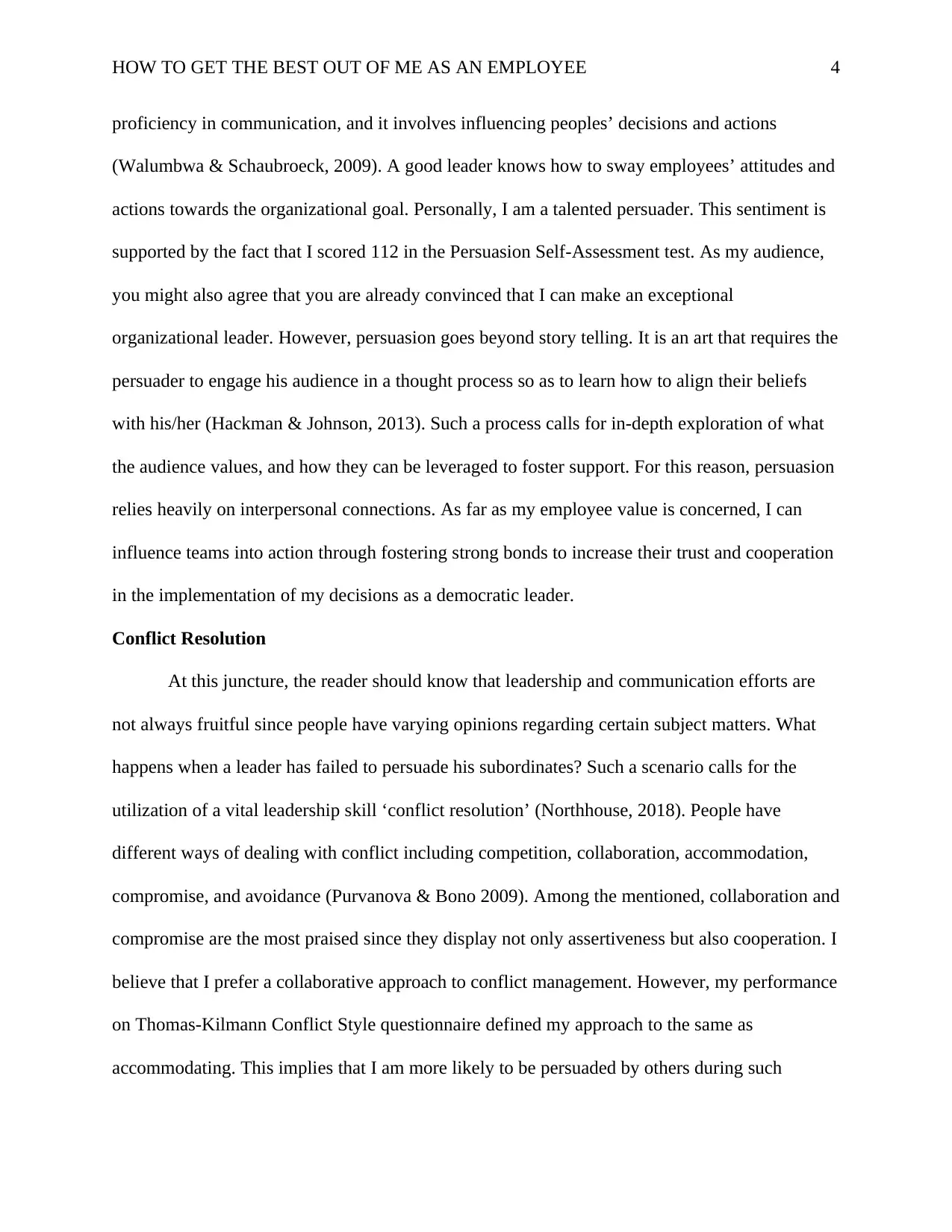
HOW TO GET THE BEST OUT OF ME AS AN EMPLOYEE 4
proficiency in communication, and it involves influencing peoples’ decisions and actions
(Walumbwa & Schaubroeck, 2009). A good leader knows how to sway employees’ attitudes and
actions towards the organizational goal. Personally, I am a talented persuader. This sentiment is
supported by the fact that I scored 112 in the Persuasion Self-Assessment test. As my audience,
you might also agree that you are already convinced that I can make an exceptional
organizational leader. However, persuasion goes beyond story telling. It is an art that requires the
persuader to engage his audience in a thought process so as to learn how to align their beliefs
with his/her (Hackman & Johnson, 2013). Such a process calls for in-depth exploration of what
the audience values, and how they can be leveraged to foster support. For this reason, persuasion
relies heavily on interpersonal connections. As far as my employee value is concerned, I can
influence teams into action through fostering strong bonds to increase their trust and cooperation
in the implementation of my decisions as a democratic leader.
Conflict Resolution
At this juncture, the reader should know that leadership and communication efforts are
not always fruitful since people have varying opinions regarding certain subject matters. What
happens when a leader has failed to persuade his subordinates? Such a scenario calls for the
utilization of a vital leadership skill ‘conflict resolution’ (Northhouse, 2018). People have
different ways of dealing with conflict including competition, collaboration, accommodation,
compromise, and avoidance (Purvanova & Bono 2009). Among the mentioned, collaboration and
compromise are the most praised since they display not only assertiveness but also cooperation. I
believe that I prefer a collaborative approach to conflict management. However, my performance
on Thomas-Kilmann Conflict Style questionnaire defined my approach to the same as
accommodating. This implies that I am more likely to be persuaded by others during such
proficiency in communication, and it involves influencing peoples’ decisions and actions
(Walumbwa & Schaubroeck, 2009). A good leader knows how to sway employees’ attitudes and
actions towards the organizational goal. Personally, I am a talented persuader. This sentiment is
supported by the fact that I scored 112 in the Persuasion Self-Assessment test. As my audience,
you might also agree that you are already convinced that I can make an exceptional
organizational leader. However, persuasion goes beyond story telling. It is an art that requires the
persuader to engage his audience in a thought process so as to learn how to align their beliefs
with his/her (Hackman & Johnson, 2013). Such a process calls for in-depth exploration of what
the audience values, and how they can be leveraged to foster support. For this reason, persuasion
relies heavily on interpersonal connections. As far as my employee value is concerned, I can
influence teams into action through fostering strong bonds to increase their trust and cooperation
in the implementation of my decisions as a democratic leader.
Conflict Resolution
At this juncture, the reader should know that leadership and communication efforts are
not always fruitful since people have varying opinions regarding certain subject matters. What
happens when a leader has failed to persuade his subordinates? Such a scenario calls for the
utilization of a vital leadership skill ‘conflict resolution’ (Northhouse, 2018). People have
different ways of dealing with conflict including competition, collaboration, accommodation,
compromise, and avoidance (Purvanova & Bono 2009). Among the mentioned, collaboration and
compromise are the most praised since they display not only assertiveness but also cooperation. I
believe that I prefer a collaborative approach to conflict management. However, my performance
on Thomas-Kilmann Conflict Style questionnaire defined my approach to the same as
accommodating. This implies that I am more likely to be persuaded by others during such
Paraphrase This Document
Need a fresh take? Get an instant paraphrase of this document with our AI Paraphraser
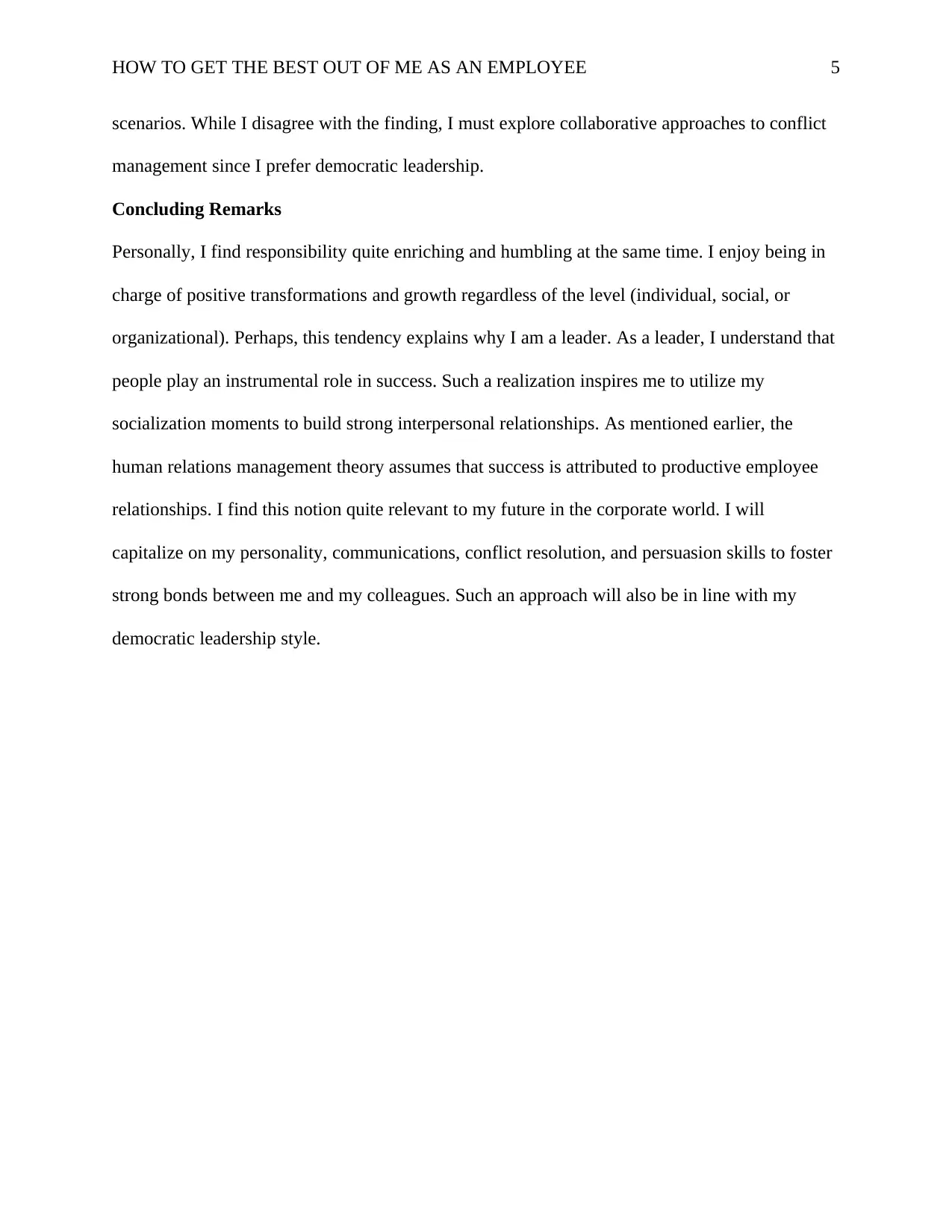
HOW TO GET THE BEST OUT OF ME AS AN EMPLOYEE 5
scenarios. While I disagree with the finding, I must explore collaborative approaches to conflict
management since I prefer democratic leadership.
Concluding Remarks
Personally, I find responsibility quite enriching and humbling at the same time. I enjoy being in
charge of positive transformations and growth regardless of the level (individual, social, or
organizational). Perhaps, this tendency explains why I am a leader. As a leader, I understand that
people play an instrumental role in success. Such a realization inspires me to utilize my
socialization moments to build strong interpersonal relationships. As mentioned earlier, the
human relations management theory assumes that success is attributed to productive employee
relationships. I find this notion quite relevant to my future in the corporate world. I will
capitalize on my personality, communications, conflict resolution, and persuasion skills to foster
strong bonds between me and my colleagues. Such an approach will also be in line with my
democratic leadership style.
scenarios. While I disagree with the finding, I must explore collaborative approaches to conflict
management since I prefer democratic leadership.
Concluding Remarks
Personally, I find responsibility quite enriching and humbling at the same time. I enjoy being in
charge of positive transformations and growth regardless of the level (individual, social, or
organizational). Perhaps, this tendency explains why I am a leader. As a leader, I understand that
people play an instrumental role in success. Such a realization inspires me to utilize my
socialization moments to build strong interpersonal relationships. As mentioned earlier, the
human relations management theory assumes that success is attributed to productive employee
relationships. I find this notion quite relevant to my future in the corporate world. I will
capitalize on my personality, communications, conflict resolution, and persuasion skills to foster
strong bonds between me and my colleagues. Such an approach will also be in line with my
democratic leadership style.
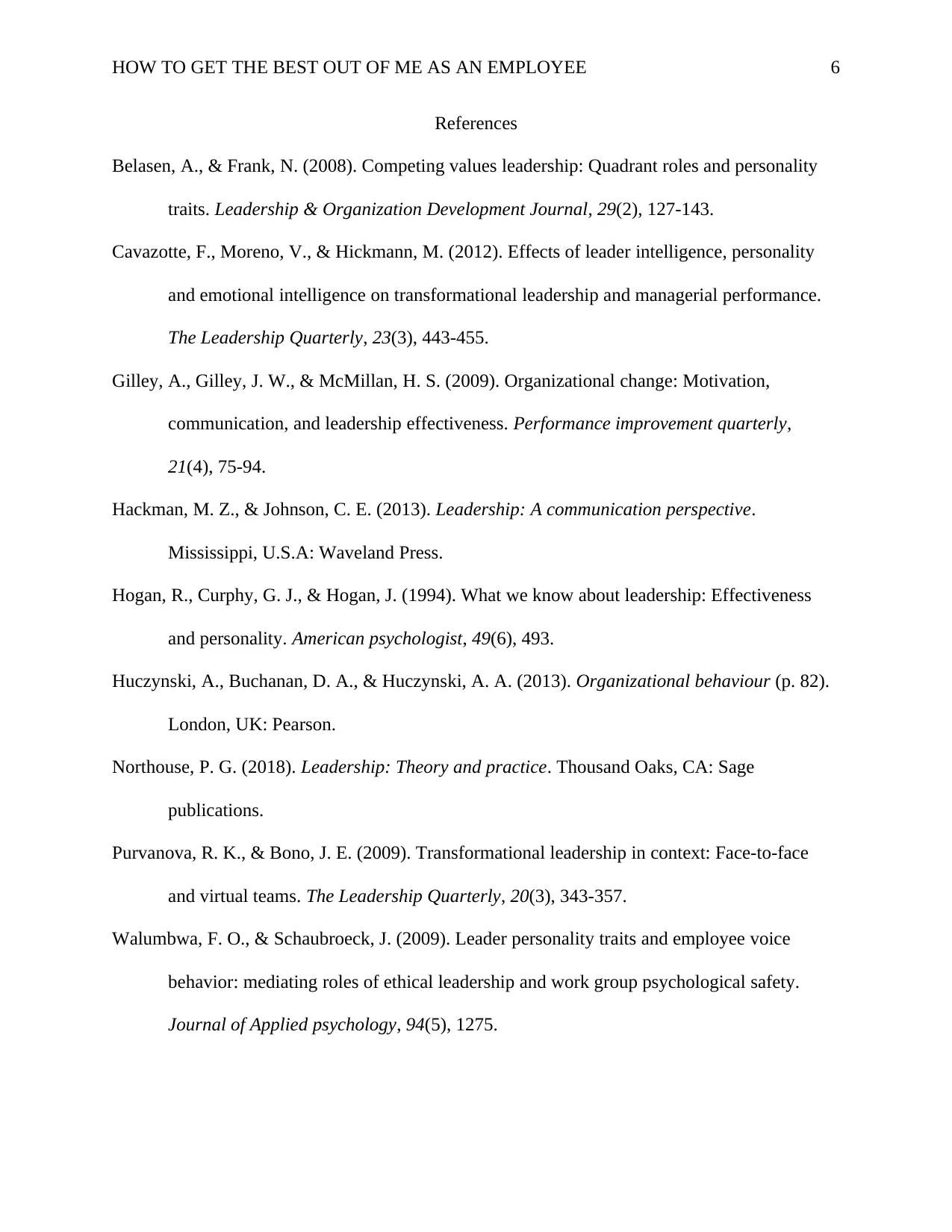
HOW TO GET THE BEST OUT OF ME AS AN EMPLOYEE 6
References
Belasen, A., & Frank, N. (2008). Competing values leadership: Quadrant roles and personality
traits. Leadership & Organization Development Journal, 29(2), 127-143.
Cavazotte, F., Moreno, V., & Hickmann, M. (2012). Effects of leader intelligence, personality
and emotional intelligence on transformational leadership and managerial performance.
The Leadership Quarterly, 23(3), 443-455.
Gilley, A., Gilley, J. W., & McMillan, H. S. (2009). Organizational change: Motivation,
communication, and leadership effectiveness. Performance improvement quarterly,
21(4), 75-94.
Hackman, M. Z., & Johnson, C. E. (2013). Leadership: A communication perspective.
Mississippi, U.S.A: Waveland Press.
Hogan, R., Curphy, G. J., & Hogan, J. (1994). What we know about leadership: Effectiveness
and personality. American psychologist, 49(6), 493.
Huczynski, A., Buchanan, D. A., & Huczynski, A. A. (2013). Organizational behaviour (p. 82).
London, UK: Pearson.
Northouse, P. G. (2018). Leadership: Theory and practice. Thousand Oaks, CA: Sage
publications.
Purvanova, R. K., & Bono, J. E. (2009). Transformational leadership in context: Face-to-face
and virtual teams. The Leadership Quarterly, 20(3), 343-357.
Walumbwa, F. O., & Schaubroeck, J. (2009). Leader personality traits and employee voice
behavior: mediating roles of ethical leadership and work group psychological safety.
Journal of Applied psychology, 94(5), 1275.
References
Belasen, A., & Frank, N. (2008). Competing values leadership: Quadrant roles and personality
traits. Leadership & Organization Development Journal, 29(2), 127-143.
Cavazotte, F., Moreno, V., & Hickmann, M. (2012). Effects of leader intelligence, personality
and emotional intelligence on transformational leadership and managerial performance.
The Leadership Quarterly, 23(3), 443-455.
Gilley, A., Gilley, J. W., & McMillan, H. S. (2009). Organizational change: Motivation,
communication, and leadership effectiveness. Performance improvement quarterly,
21(4), 75-94.
Hackman, M. Z., & Johnson, C. E. (2013). Leadership: A communication perspective.
Mississippi, U.S.A: Waveland Press.
Hogan, R., Curphy, G. J., & Hogan, J. (1994). What we know about leadership: Effectiveness
and personality. American psychologist, 49(6), 493.
Huczynski, A., Buchanan, D. A., & Huczynski, A. A. (2013). Organizational behaviour (p. 82).
London, UK: Pearson.
Northouse, P. G. (2018). Leadership: Theory and practice. Thousand Oaks, CA: Sage
publications.
Purvanova, R. K., & Bono, J. E. (2009). Transformational leadership in context: Face-to-face
and virtual teams. The Leadership Quarterly, 20(3), 343-357.
Walumbwa, F. O., & Schaubroeck, J. (2009). Leader personality traits and employee voice
behavior: mediating roles of ethical leadership and work group psychological safety.
Journal of Applied psychology, 94(5), 1275.
⊘ This is a preview!⊘
Do you want full access?
Subscribe today to unlock all pages.

Trusted by 1+ million students worldwide
1 out of 6
Related Documents
Your All-in-One AI-Powered Toolkit for Academic Success.
+13062052269
info@desklib.com
Available 24*7 on WhatsApp / Email
![[object Object]](/_next/static/media/star-bottom.7253800d.svg)
Unlock your academic potential
Copyright © 2020–2025 A2Z Services. All Rights Reserved. Developed and managed by ZUCOL.





